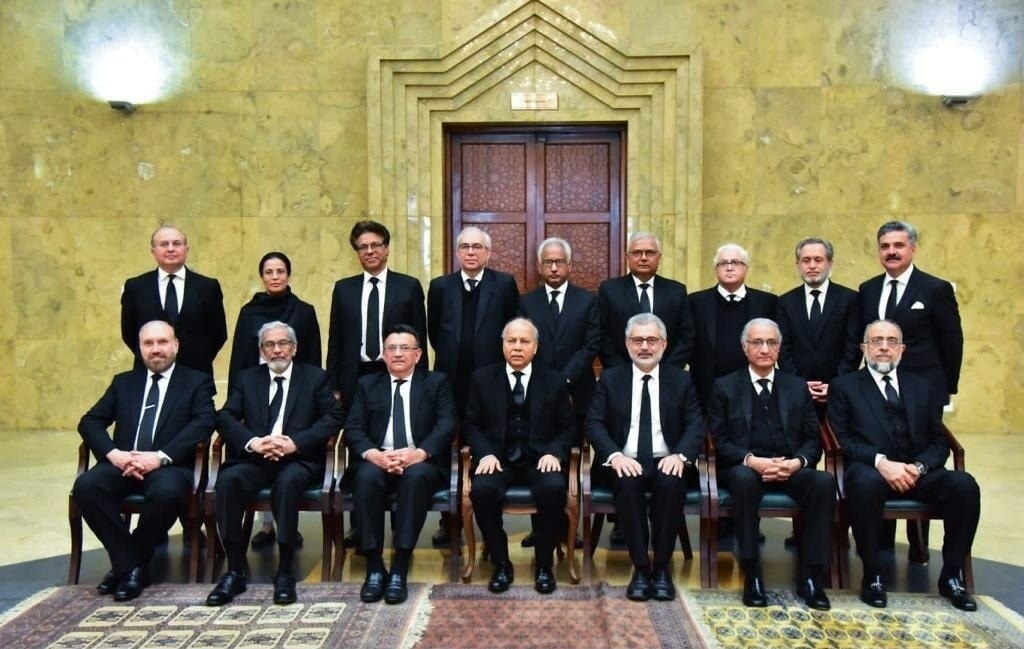Outgoing Chief Justice of Pakistan (CJP) Gulzar Ahmed on Tuesday said he was pleased to have authored verdicts in 4,392 cases during his tenure as the country's top judge, pointing out that he had to a large extent reduced the backlog of cases he inherited after taking charge.
He made these remarks while addressing a full-court reference organised in his honour at the Supreme Court on the eve of his retirement.
In his remarks at the ceremony today, Justice Ahmed said at least 38,680 cases were pending when he took charge as the CJP and around 27,426 cases had been decided by the end of his tenure.
"As chief justice, I not only decided cases but also took charge of administrative matters," he said.
Justice Ahmed had taken oath as the country's 27th chief justice on December 21, 2019, replacing Justice Asif Saeed Khosa. Justice Umar Ata Bandial will take charge as the chief justice of Pakistan tomorrow (Wednesday).
Justice Ahmed said he had performed his duty with honesty even when he was serving as a judge of the Sindh High Court.
Recalling the challenges during his term as the top judge, Justice Ahmed said the coronavirus pandemic began soon after he took charge in December 2019.
"I also had to take care of the health of the judges and staff as well as carrying on other work. Hence I directed Karachi, Lahore, Peshawar and Quetta registries to start virtual hearing of cases," he added.
He credited his father, Noor Mohammad Advocate, for his professional success.
"I am now bidding farewell to my journey with the judiciary that began in 2002," the outgoing CJP said.
'CJP violated principles in judges appointment'
In his address on the occasion, Supreme Court Bar Association (SCBA) President Mohammad Ahsan Bhoon said Justice Ahmed had violated the principle of seniority in appointments to the superior judiciary.
Due to this "violation of merit" in appointments, Bhoon said, the judiciary was facing a serious crisis.
"If the decisions of the top court and the standards of their implementation are synchronised, then no one will have a chance to point fingers at the court," he added.
Most of the appointments of judges in the Supreme Court of late were made on the basis of personal likes and dislikes, Bhoon told the gathering.
Talking about Justice Qazi Faez Isa, Bhoon said the family of the senior judge faced humiliation. However, he added that the decision of the apex court to strike down false references against Justice Isa was historic.
Bhoon also went on to praise the outgoing top judge for some of his decisions. "The verdict of Justice Gulzar Ahmed against the dissolution of local governments was a historic one."
Read more: SC orders restoration of LG institutions in Punjab
Attorney General of Pakistan Khalid Javed Khan said it was necessary to create an ideal procedure for the appointment of judges, "but the current system has yielded good results".
He said the outgoing chief justice deserved credit for encouraging debate on the matter in the Judicial Commission of Pakistan.
Khan said Justice Ayesha Malik's recent appointment as the first female Supreme Court judge was on merit, adding that "transparency in the appointment of judges cannot be compromised."
Justice Gulzar — the 27th Chief Justice of Pakistan
Justice Ahmed, who was sworn in as the 27th chief justice of Pakistan on December 21, 2019, was born on February 2, 1957, in Karachi to the family of Noor Muhammad, a distinguished lawyer.
His elementary schooling was from the city's Gulistan School, according to the Supreme Court website. He then went on to earn a Bachelor of Arts degree from Government National College, Karachi after which he obtained his law degree from S.M. Law College, Karachi.
He enrolled as an advocate on January 18, 1986, and joined the High Court on April 4, 1988. Subsequently, he became an advocate of the Supreme Court on September 15, 2001.
Justice Ahmed was elected honorary secretary of the Sindh High Court Bar Association in Karachi for the year 1999-2000.
Throughout his legal practice, he mostly remained on the civil-corporate side, serving as the legal advisor to numerous multinational and local companies, banks and financial institutions.
Ahmed was elevated as Judge of the Sindh High Court (SHC) on Aug 27, 2002. He was notified as Senior Puisne Judge of the SHC on Feb 14, 2011, and was elevated to Supreme Court later that year on November 16.














































